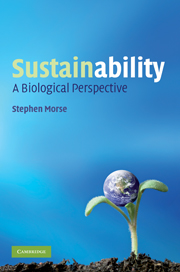Book contents
- Frontmatter
- Contents
- Preface
- 1 Sustainability: a word of our time
- 2 Sustainable agriculture: more and more production
- 3 Sustainable management of fisheries
- 4 Applying sustainability to industry
- 5 Social and economic dimensions to sustainability
- 6 The ‘doing’ of sustainability
- 7 Sustainability science?
- References
- Index
5 - Social and economic dimensions to sustainability
Published online by Cambridge University Press: 05 June 2012
- Frontmatter
- Contents
- Preface
- 1 Sustainability: a word of our time
- 2 Sustainable agriculture: more and more production
- 3 Sustainable management of fisheries
- 4 Applying sustainability to industry
- 5 Social and economic dimensions to sustainability
- 6 The ‘doing’ of sustainability
- 7 Sustainability science?
- References
- Index
Summary
INTRODUCTION
So far in this book we have focused on production and throughout the discussion we have touched upon social and economic aspects. Total factor productivity in Chapter 2 was expressed in monetary terms and, while MSY was derived from biological principles in Chapter 3, it was stressed how economics also matter (as with the extension of MSY to MEY). In Chapter 4 we explored energy (and related concepts), life-cycle analysis, Natural Steps and so on, but socio-economic dimensions continued to emerge. Towards the end of the chapter, social and economic issues were brought to the fore with a discussion of corporate sustainability and corporate social responsibility. This intertwining of biology with economic and social dimensions is inescapable in sustainability, and this theme will form the basis for this chapter.
The language of sustainability has often been expressed in economic as well as scientific terms. Science may provide the soul of sustainability, but the practice is often tied to economics, and hence to politics. Some use the term ‘weak sustainability’ to bring out a compromise between a desire to achieve the environmental changes necessary for sustainability and to express this in financial terms. This allows us to estimate the costs and benefits from a programme and thereby gauge the best value for money and make any trade-offs transparent. This contrasts with strong sustainability, where there is no such compromise.
- Type
- Chapter
- Information
- SustainabilityA Biological Perspective, pp. 142 - 170Publisher: Cambridge University PressPrint publication year: 2010



